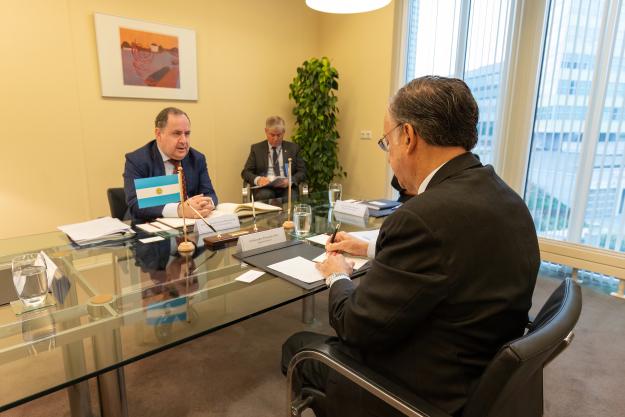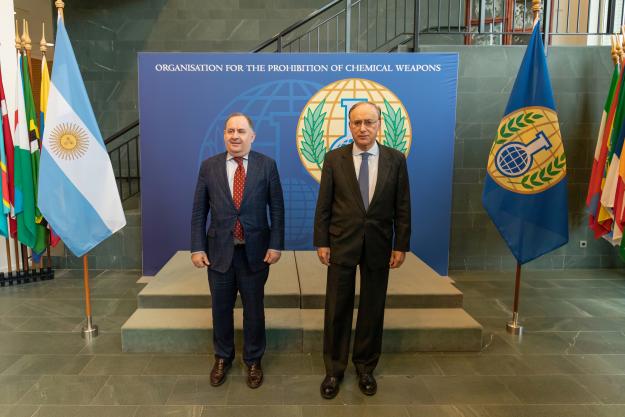
THE HAGUE, Netherlands—6 October 2022—The Director-General of the Organisation for the Prohibition of Chemical Weapons (OPCW), Ambassador Fernando Arias, met today with H.E. Ambassador Claudio Javier Rozencwaig, Undersecretary for Foreign Policy of the Argentine Republic.
The Director-General and the Undersecretary discussed the progress in the implementation of the Chemical Weapons Convention (CWC). The Director-General briefed H.E. Mr Rozencwaig on the opportunities and challenges facing the CWC with regard to recent scientific and technological developments and the importance of maintaining the global taboo against the use of chemical weapons. The role of the OPCW after the destruction of declared stockpiles was discussed, including the importance of the use of the new OPCW Centre for Chemistry and Technology in the on-going endeavour to rid the world of chemical weapons.
The Undersecretary for Foreign Policy stated: “Argentina is unequivocally committed to disarmament and non-proliferation policies and international cooperation. It recognises the need to guarantee the sovereign right to research and to develop technologies for peaceful purposes, in accordance with international commitments and national legislation.”
Ambassador Arias thanked the Undersecretary, commending Argentina for its “staunch support of the OPCW and the Convention, and its commitment to working to ensure that chemistry is used exclusively for peaceful purposes.”

Background
Argentina has been an active member of the OPCW since the Chemical Weapons Convention entered into force in 1997. Argentina is a member of the Executive Council, the OPCW’s executive organ, which is charged with promoting the effective implementation of and compliance with the Chemical Weapons Convention as well as supervising the activities of the Organisation’s Technical Secretariat.
The project to build the ChemTech Centre seeks to strengthen the OPCW’s capabilities to fully address new and emerging chemical weapons threats. The new facility will be used to meet the demands of OPCW Member States for enhanced verification tools, improved detection capabilities and response measures, as well as increased capacity-building activities.
As the implementing body for the Chemical Weapons Convention, the OPCW, with its 193 Member States, oversees the global endeavour to permanently eliminate chemical weapons. Since the Convention’s entry into force in 1997, it is the most successful disarmament treaty eliminating an entire class of weapons of mass destruction.
Over 99% of all declared chemical weapon stockpiles have been destroyed under OPCW verification. For its extensive efforts in eliminating chemical weapons, the OPCW received the 2013 Nobel Peace Prize.
